I was really little when my dad read The Hobbit and The Lord of the Rings to me. Young enough, Mom claims that, when they transferred me to my big boy bed, I was crying “it burns, it freezes,” like Gollum. Shit you not. I have almost no memories of a time before having read those books.
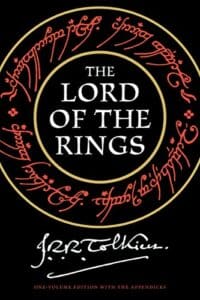
a subgenre of fantasy which can refer to literary, artistic, and cinematic works that incorporates darker and frightening themes of fantasy. It also often combines fantasy with elements of horror. The term can be used broadly to refer to fantastical works that have a dark, gloomy atmosphere or a sense of horror and dread.
—Wikipedia on “Dark Fantasy”
So, yeah, I love fantasy. And these days, the fantasy I love the best is dark fantasy and historical fantasy. In fact, dark fantasy naturally tends to go hand-in-hand with low or historical fantasy. After all, in a more “realistic” setting, we are more apt to be scared by the supernatural. The more real the rest of the world, the more real the horror seems. Because of this, dark fantasy can blend with gritty fantasy to create grimdark.
So first up, a definition. The term grimdark was originally a pejorative derived from the description of Warhammer 40k description (“In the grim darkness of the far future, there is only war.”)
And then the writers of this subgenre took the “insult” and made it their own. By claiming their own work as grimdark, they striped the term of its ability to be an insult.
As to what it refers, this tends to be kind of subjective, so different people will claim a particular book is or isn’t grimdark. For the purposes of this article, I’m speaking specifically of grimdark fantasy, though the term sometimes gets applied to sci-fi, superheroes, or whatever else. And in fantasy, it usually means you have a dark fantasy setting (more on that later, but we’ll call this necessary but not sufficient) where the rose-colored paint has been scraped off your glasses.
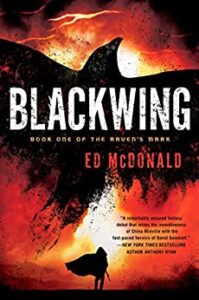
What this generally means is that Grimdark writers end up writing low-fantasy (e.g. low levels of magic, few wizards, monsters are considered rare etc.) because it’s a more appropriate setting for our down and dirty characters. It’s not so easy to be a grizzled old grouch when you’re backed by a chorus of singing elves.
—Ed McDonald, author of Blackwing
People curse with real profanity, the violence is usually graphic, there’s actual sex, romances often fail, and “heroes” aren’t always that heroic. People are flawed. In other words, it’s like trying to ground fantasy in reality by limiting the divergence from the real world to deliberately speculative elements.
My friend and fellow author Rob J. Hayes helps define grimdark:
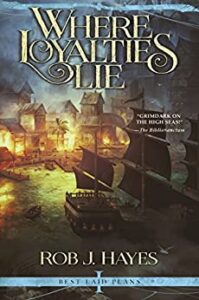
Grimdark is still a term that no one seems to agree on its definition. Some people seem to think it’s about the gore and ultra-violence, others say it’s about the realism, and others still that it’s about the gritty world and morally grey people that live in it.
Personally, I believe grimdark to be about hope and contrast. Yes, the world you’ll find in a grimdark story is usually a horrible one and the people that inhabit it are undoubtedly products of that environment. But grimdark is about the light you find within that darkness. It’s about the brief flickers of humanity you find in characters that would usually be classed as villains, and it’s about how those flickers actually burn brighter for all the layers of dirt and grit and shit that they’re buried in. Because honestly, the most compelling grimdark books I’ve read so far have been the ones to show us that even villains can be heroes.
—Rob Hayes, author of the Best Laid Plans series
C.T. Phipps is an avid reader and writer of grimdark:
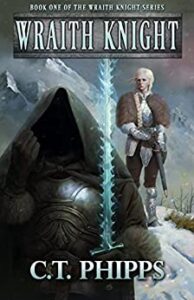
Grimdark is basically taking the darkness, tragedy, violence, terror, and horror of several different genres then putting them into a blender and hitting frape. Horror stories are, usually, something terrible and vile intruding on an otherwise normal setting to ruin it. Noir stories are cold, bleak, and empty of good but for faint flickers. Fantasy story stories often have terrible supernatural evils opposed by equally supernatural goods.
Grimdark takes away the normality and good to leave bad and bigger bad. Grimdark is spikes on spikes, ancient horrors, immense poverty, entrenched systematic cruelty, basic human selfishness, and hopelessness.
And it’s kind of awesome.
—C.T. Phipps, author of Wraith Knight
Grimdark Magazine had a recent article that suggested grimdark is the natural maturation of the old and possible dead genre of sword & sorcery. Recall that Conan (and his successors) had a self-interested barbarian “hero” who spent most of his time robbing people. When he encounter sorcerers and magic, those were evil (black and gray morality, anyone). And Howard even drew influence from the Cthulhu Mythos.
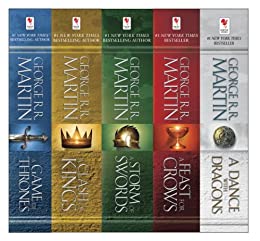
It has been said that Tolkien helped codify high fantasy and George R.R. Martin codified the grimdark movement (neither term existed at the time the authors were writing), partly as a reaction to high fantasy moving away from the grittier roots in sword & sorcery (which itself seems codified by Robert E. Howard). In fact, later sword & sorcery author Michael Moorcock had already moved the needle further in that direction with his morally ambiguous Elric stories in the 1970s.
My own work tends to be either outright grimdark (most of the Runeblade Saga, for example) or at least to veer into it.
Before I get into the point of this, I need to say a bit more about the “dark” half of grim dark. In a dark fantasy, the supernatural is subversive. Magic and spirits are alien, inhuman, and often inimical to humanity. Combine this with black and gray morality necessary in most historical themed settings, and you get visions like Game of Thrones. (And no, I don’t think any of my work has anything quite so painful as the Red Wedding.)
Do you want fiction to be scary? I mean that’s kind of up to you. But I feel like fantasy and sci-fi are more powerful when the speculative elements are frightening.
“The three types of terror: The Gross-out: the sight of a severed head tumbling down a flight of stairs, it’s when the lights go out and something green and slimy splatters against your arm. The Horror: the unnatural, spiders the size of bears, the dead waking up and walking around, it’s when the lights go out and something with claws grabs you by the arm. And the last and worse one: Terror, when you come home and notice everything you own had been taken away and replaced by an exact substitute. It’s when the lights go out and you feel something behind you, you hear it, you feel its breath against your ear, but when you turn around, there’s nothing there …”
— Stephen King
So why read dark fantasy?
In his essay on “Supernatural Horror in Literature,” H.P. Lovecraft wrote: “The oldest and strongest emotion of mankind is fear, and the oldest and strongest kind of fear is fear of the unknown.”
The easy answer, the rush of adrenaline triggering dormant flight or fight instincts, is true. But maybe that’s not enough. In prompting fear or horror in the reader, an author brings that reader closer to the perspective of the character for a more fulfilling emotional journey and a more powerful catharsis on its resolution. If the goal of fiction is create emotion and introspection in the audience, then that emotional spectrum cannot be complete without the emotion of fear.
Moreover, regarding my work, I’m retelling myths and legends and fairytales. The thing about that is, to maximize on meaning, we need to see the stories within the context of their original cultures or a rough stand-in of those. And our ancestors were legitimately scared of the supernatural. They tried to reason with it or control it with magic, but mostly, they tried to avoid it. People really believed in invisible worlds and ghosts and demons that could wreck all kinds of harm.
So if we’re thinking about a ghost and making it Casper, that’s just not going to fit with how most people would’ve felt about being haunted. They’d be scared shitless. They’d flee a house and never return. And somewhere along the line, fantasy kind of lost that. Fantastic creatures become “cool” instead of horrifying. Magic and the supernatural became stand-ins for superpowers.
But even if we think horror and darkness belong … what about grit?
What about grimdark?
I mean, we’re talking about books that basically celebrate sex, profanity, and violence. Right?
Well, no.
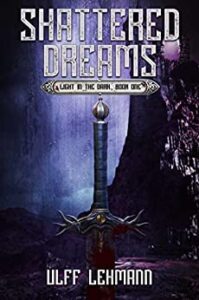
“The fallacy, in my opinion, of “there are no heroes” is that “everyone is a villain.” It’s the same fallacy as “without light there’s only darkness.” Ask a blind person what darkness is. There cannot be darkness without light. Maybe it is too philosophical a topic for many, but the point is: how can anyone be a bad guy when there are no good guys? If everyone is a villain, then everyone, by the same measure, is also a hero.”
-Ulff Lehmann, author of Shattered Dreams (original interview)
Sex is a fundamental part of the human experience, affecting the vast majority of people on conscious and subconscious levels pretty much all the time. To fail to acknowledge this is to render a rather significant part of a character moot and deprive him or her of depth.
People in stressful situations, most especially military ones, use profanity. All the fucking time. And to make up swear words to avoid giving offense is often disingenuous. The point of the swear words themselves is to produce a visceral reaction in the speaker, the listener, the reader. No made-up in-world curse will have that effect on the reader.
But these are about the verisimilitude of fiction. Violence, portrayed graphically, is something else, something in line with but beyond these concerns. And sure, some writers, some readers, they may like graphic violence for titillation. But it serves best when it makes us wince, cringe, and want to turn away. Because that’s when it serves to remind us … violence is something horrible (as in something belonging in horror, and hence, dark speculative fiction).
Everyone has seen the original Alien movie right? It could not have achieved the same effect if the chest-bursting scene was not depicted (setting aside the obvious sexual undertones—yeah, we’re back to that, it really effects everything—of both the aliens and of that particular scene). The movie is a horror masterpiece because the director knew what to show and what to keep hidden until it had maximum impact.
In some epic fantasy, writers gloss over the effects and aftermath of violence, focusing on the heroic fights or whatever. People don’t suffer maimings, they don’t die terrible deaths of festering wounds, they don’t bleed out alone in a pool of blood and shit. War becomes glorious.
And doing that, glossing over the icky parts … that glorifies violence itself. Portraying the killing of other people as anything less than horrific depicts the mere act of violence as almost heroic, rather than a sometimes necessary evil. The best grimdark works show war and battle—without ever explicitly saying so—as often pointless engagements that leave neither side better off than before.
General Sherman said “War is hell.” Violence begets violence including propagating into other forms of hateful abuses heaped onto our fellow humans: torture, rape, and any other means of dehumanizing individuals. Those relying on violence will often be drawn from one form to the next.
This nihilism grounds the story in reality, stripping away the rose-colored glasses that might otherwise allow us to believe violence should be the first recourse instead of the last. It presents people with no good choices, and often with no clear heroes or villains. There are people making choices—often bad ones—just trying to get by.
To me, these dark works are the ones that resonate with the highest degree of verisimilitude. Dark fiction works for me because I believe it. And I want you to believe it too.
George R.R. Martin was quoted saying “the villain is the hero of the other side.” I look at this as a baseline for most sides of a conflict in my work.
So, when crafting the Eschaton Cycle, I started with a dark fantasy foundation. And I don’t think grimdark is a bad thing. When the violence isn’t realistic and horrifying, when it doesn’t make you cringe, that to me, is the worse alternative.

Fantastic article friend. Very good points from multiple authors and perspectives.
Thanks, Charles!
[…] Like everything else, the choice of setting, or tone, or general approach is part of the overall storytelling. While a writer can choose an element just to be cool or funny, in best cases the choice of these elements is done to support the story being told. A writer wouldn’t generally set a story about kids hanging out and just having a good time in a run down fishing village on the East Coast unless the juxtaposition of those ideas is meaningful. And so it is that they don’t add elements that drive the presentation into someplace dark unless those elements are being used to communicate something specific. For example, while I have said I don’t think the specific implementation of the overt violence in DC’s Titans to have been handled well, the storytelling intent of it is quite clear. The very visceral, and very visible, volley of volcanic violence is there to make you squirm because the storytelling is informing you that what is happening is not a good thing. It’s horrible; and it’s shown as being horrible because the effects of that horror are what the characters are dealing with. In this particular case you could possibly edit out, or around, the graphic violence as seen on screen but one has to ask the question of whether or not that would hurt the story being told. It is, after all, very difficult to understand how hard someone is struggling if you never understand what it is they’re struggling with. To show this violence and it’s consequences often has the opposite effect of pure titillation, despite the criticism of some. As writer Matt Larkin put it in his essay What Grimdark Means And Why It Matters, […]
[…] I wrote an article about it. I quoted grimdark author/literary/game critic C.T. Phipps in the article. So I was familiar with him in the space, but I had never read one of his books. And I figured it was about time … […]
[…] Matt Larkin, What Grimdark Means and Why It Matters? (2018) (traduzione propria) <https://www.mattlarkinbooks.com/what-grimdark-means-and-why-it-matters/> [consultato il 16 maggio […]
[…] readers and writers of the genre, on the other hand, defend its tropes by asserting the genre’s emotional accuracy—that the nihilism, violence, and individualistic grabs for power, disregarding others and […]
[…] craft. I was first exposed to Sanderson through his Mistborn series which I loved at the time (my taste has sense grown in the direction of darker, more mature books generally termed grimdark). Sanderson is a brilliant plotter and worldbuilder, and I very much respect his magic systems as […]
[…] What Grimdark Means & Why It Matters […]